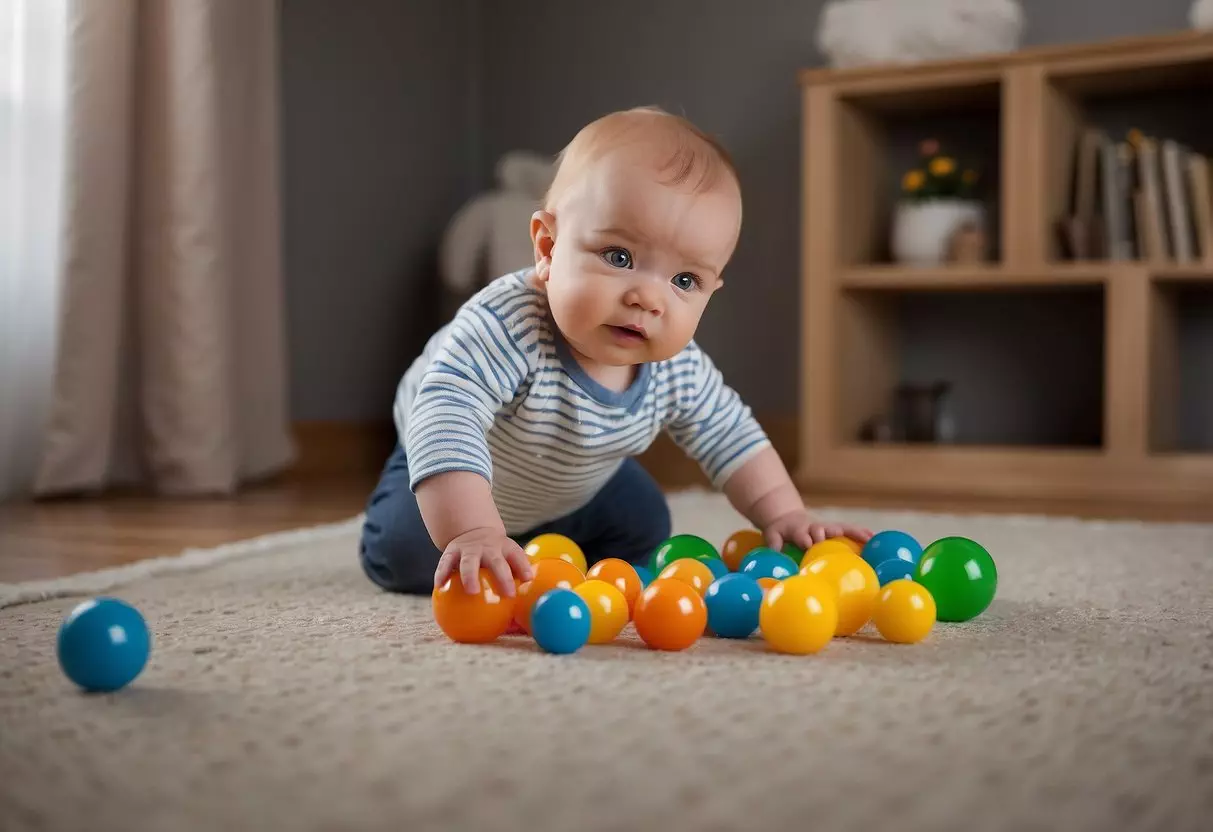Can a 9 Month Old Understand No? Exploring Early Child Comprehension
At nine months old, your baby is starting to understand more about the world around them. Babies can begin to recognize and understand the meaning of “no” at this age, but it takes lots of repetition and patience. This developmental milestone is the first step in helping them learn boundaries and rules.

You might notice that your little one can now recall your words, actions, and tone more effectively. This is because their memory is improving, making them more receptive to learning new things. It’s a fun and rewarding time as you see your baby’s growing curiosity and awareness.
As your baby explores, be prepared to say “no” frequently. Remember, each time you do, you’re teaching them important lessons about safety and behavior. And while it can sometimes feel exhausting, these early interactions are crucial for their development.
Table of Contents
Understanding a Baby’s Development at 9 Months

At 9 months, your baby is hitting new milestones and growing rapidly. They are developing motor skills, language abilities, and social behaviors. Each of these areas has specific changes you can observe and support.
Developmental Milestones and Brain Development
At 9 months, your baby might hit key developmental milestones like sitting without support and beginning to crawl. Their brain is learning to process more complex tasks. This period can feature a growth spurt, which may affect sleep and mood. Monitoring their progress helps ensure they are on track.
Most babies will recognize familiar faces and start to show preferences for certain people and toys. Stackable toys and simple games like peek-a-boo can encourage brain development and social interaction.
Motor Skills and Physical Growth
Motor skills at this age include crawling, pulling up to stand, and sometimes cruising along furniture. Your baby may start to explore their environment more freely. This exploration is crucial for physical development.
Encouraging your baby to reach and grab helps strengthen their muscles. It’s also a good time to invest in a comfortable crib mattress, as they might start moving around more at night. Their average weight and length also see noticeable changes during this growth phase.
Language Development and Communication
Babies typically start to understand simple words and respond to their name. They will make noises to get your attention and might begin to use gestures like waving. Babbling is common and can include combining sounds like “mama” or “dada.”
Creating a consistent routine around talking and reading to your baby can support these skills. Pointing to objects and naming them enhances their vocabulary, even if they can’t speak the words themselves yet. They might stop an activity when you say “no,” indicating they’re starting to understand limits and boundaries.
Emotional and Social Development
Emotional milestones at this age include showing affection for caregivers and developing a sense of trust. Your baby will begin to show stranger anxiety and might be more clingy around unfamiliar people. Playing with trusted adults supports their emotional growth.
Socially, babies enjoy interactive play and may mimic expressions and sounds. Building a bond through consistent and loving interactions helps them feel secure. They begin to explore their emotions through different facial expressions and reactions.
Find more detailed information about your baby’s development at 9 months on this CDC checklist.
Interactions and Learning Processes

At nine months old, babies are actively engaging with their environment and caregivers, which supports their brain growth and understanding of social interactions. Play, reading, and consistent communication play a crucial role in this stage.
The Role of Play and Exploration
At this age, play is essential for your baby’s development. Simple games like peek-a-boo or cause and effect toys help them recognize patterns and understand the world around them. Playing with blocks or stacking cups can boost their cognitive skills.
Encourage exploration by providing safe spaces where they can move around and interact with different textures and objects. This helps in developing their motor skills and curiosity. Pointing and gestures are common now, which shows they are learning to communicate.
Reading and Conversational Practices
Reading to your baby daily is vital. Choose books with bright pictures and simple words. When you talk to your baby, describe the actions and objects around them. Point to pictures in the books as you read, so they start connecting words with images.
Conversational practices include talking about your day, naming objects, and using varied tones of voice. Babies at this age enjoy mimicking sounds and may start babbling more. This helps in developing their language skills and understanding communication.
Understanding ‘No’ and Setting Limits
Nine-month-old babies can start to understand simple instructions, like the word “no.” It’s important to be consistent when setting limits. For example, if they are trying to touch something unsafe, firmly say “no” and redirect their attention to a safe activity or toy.
Repeat the word while using a serious tone. Over time, they’ll recognize the word “no” and associate it with boundaries. Setting limits helps in developing self-control and understanding acceptable behavior. Always follow up with positive reinforcement when they follow directions.
Safety, Health, and Well-Being

Ensuring your 9-month-old’s safety, health, and well-being is vital. It’s important to pay attention to their diet, prevent accidents, and keep up with pediatrician visits.
Feeding and Nutrition
At 9 months old, your baby is likely transitioning to solid foods. They should have a mix of breast milk or formula and solid foods like pureed fruits, vegetables, and small pieces of soft food. Avoid foods that are choking hazards such as nuts, whole grapes, and chunks of meat.
Offer a variety of foods to help develop their taste preferences and nutrition balance. Ensure that your baby’s diet includes iron-rich foods to support their rapid growth and development. Remember that as babies get distracted easily, meal times should be calm to ensure they eat well.
Preventing Accidents and Ensuring Safety
As your 9-month-old begins to explore, it’s essential to baby-proof your home. Babies at this age start to crawl, pull up to standing, and might soon start walking by holding onto furniture. Install safety gates at the top and bottom of stairs and use corner protectors on sharp edges.
Keep small objects out of their reach to prevent choking. Always supervise your baby during bath time to prevent accidents. Secure heavy furniture to the wall to prevent it from tipping over if your baby tries to climb it. Also, ensure that electrical outlets are covered to avoid any danger.
Pediatrician Visits and Health Checks
Regular visits to the pediatrician are crucial for your 9-month-old. Your doctor will check your baby’s growth, development, and provide necessary vaccinations. They will also check for any developmental milestones such as memory and responding to “no”.
It is important to monitor your baby’s weight, height, and head circumference. These visits are a good opportunity to discuss any concerns you might have about your baby’s health, behavior, and diet. Remember to keep a list of questions to ask during the visit to make the most of the appointment.
Ensuring your 9-month-old’s health and safety involves attentive care, proper feeding, accident prevention, and regular health checks.
Nurturing Your Baby’s Emotional Intelligence

Helping your baby grow emotionally involves responding to their feelings and building a secure environment. This makes them feel loved and respected.
Responding to Emotional Cues
Babies express their needs through emotions like crying, laughing, or looking sad. Respond to these signals quickly and gently. If your baby seems upset, identify the cause and comfort them. Hugging them, speaking softly, or cuddling can make them feel safe and valued.
It’s also important to offer praise when your baby shows positive feelings. Say kind words or clap when they smile or giggle. This kind of praise encourages them to show more positive emotions and understand their feelings better.
Building Trust and Security
Building trust with your baby means being reliable and caring. Feed them when they are hungry, change them when they need it, and comfort them when they cry. This helps your baby trust you and feel secure.
Make sure you spend quality time together. Play with your baby, read to them, or sing songs. These activities foster a strong bond and show your baby they are loved. Regular routines also help. Knowing what to expect makes your baby feel safe and secure in their environment.
This combination of love, consistent care, and attention helps your baby grow emotionally intelligent. They will learn to communicate their feelings effectively, making a strong foundation for the future.
